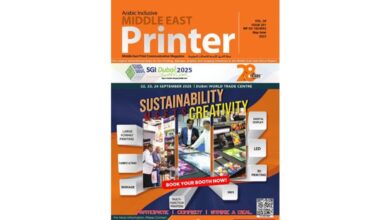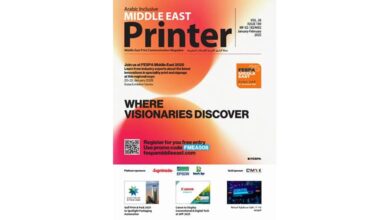Idealliance MENA Affiliate Supports Profitable Growth Opportunities

The burgeoning Middle East/North Africa (MENA) printing market offers virtually limitless growth and profitability potential for printers and visual communications services companies who can meet the increasingly stringent demands of buyers in the region and around the globe. With enormous growth focused on education and huge brands represented in the area, it is an economy and region that focuses on setting the pace of what is possible and extending to what is almost beyond imagination.
In “The Future of Print in the Middle East and North Africa to 2022,” industry analysts from Smithers Pira characterize the outlook for printing in the region as “dynamic” and predict market growth from $35.1 billion in 2017 to $54.0 billion in 2022 with an annual cross-segment growth of a vigorous 9.0%. They also believe MENA consumption of printed materials will rise from 15.8 million metric tonnes in 2017 to 22.6 million over the next five years.

But printing companies will be able to take full advantage of this current and future market growth only if they can provide buyers with the service and predictable quality they want by using the most advanced printing and packaging industry specifications, standards, and processes.
To give companies in the region ready access to the knowledge and training that will enable them to do so, Idealliance, the global non-profit for the Visual Communications and Media Industry, now maintains a global alliance office in Dubai, United Arab Emirates.
“We are entering and expanding in areas where printing, packaging, and publishing are strong and where we can help support the industry’s global growth,” says Tim Baechle, Idealliance Vice President, Global Print Technologies & Workflows. “The UAE is such an incredibly progressive market that serves as a barometer for what’s going to happen with the industry in this part of the world.”
The Dubai global office serves the MENA region under the leadership of Managing Director Afsal Kottal, a Printing Technologist. He has decades of experience as an industry expert, along with his team, in the field of colour management, workflows, hardware, specifications, ISO Standards, and process control, guiding some the largest brands in the world.

“We are excited to bring Idealliance’s training, education, and certification resources to printers right here in the Middle East and North Africa,” says Kottal. “The ability to implement industry-leading specifications such as G7, SWOP, GRACoL, and BrandQ can give companies serving print and packaging customers an important competitive edge.”
Idealliance global offices offer companies in their geographic areas Idealliance training, consulting, and transformative educational and business management services, including certifications, innovative learning events with leading experts, and other educational programs, as well as the implementation of specifications, standards, colour management, process control, and workflow efficiency.
While Idealliance’s eleven global offices work independently within their regions to meet the specific needs of their respective areas, they communicate regularly with each other and with Idealliance in the United States to share information and insights. Each office also draws on a network of educators and consultants within its region.
Tailored Training
“Operating within the region gives us unique, the on-the-ground knowledge we can use to tailor Idealliance training to cover the specific requirements and meet the unique challenges faced by companies in our part of the world,” says Kottal.
He notes that the market in packaging and printing is growing in the region and that, “unlike before, brand owners are now demanding colour consistency across the supply chain.” According to Kottal, the region has print and packaging companies using flexo, offset, gravure, digital, newspaper, brand ownership, premedia, and design to supporting activities in food, metal- and flexible packaging as well as folding and corrugated cartons.
“Companies seeking to serve local, regional, and international brands must be able to ensure buyers that their quality requirements will be met on every job every time, particularly in relation to brand colour integrity across multiple substrates,” he continues. “The certifications they can earn through Idealliance training can provide their customers with the assurance that their jobs will meet the highest industry standards for colour consistency.”
The newest Idealliance standard, BrandQ, for example, is a ground-breaking ISO standard-driven certification program focused on the packaging supply chain, which also has various certification and training programs (multi-tiered programs) for anyone in the packaging supply chain eco-system—providing tools, measurements, methods, and all the language for facilitating effective communications between brands and suppliers.
Last fall, G7 expert Ron Ellis conducted a packaging-focused keynote workshop on G7 and BrandQ at the Middle East Packaging Summit in Dubai. Although a number of Middle East printers, brands, and brand owners had received Idealliance training at programs in India and the Pacific Rim, at the Middle East Packaging Summit in Dubai, Idealliance was asked to Chair the conference—led by Tim Baechle—and had the opportunity to present the BrandQ Program in the Middle Eastern region just days after the official BrandQ launch at the PRINT17 international exhibition in the United States.
Streamline Processes
“We implement standardization in prepress, proofing, viewing areas, ink, printing, and more,” says Kottal. “We will guide printers to streamline their processes with G7 methodology, and printers who want to get their process optimized to G7/GRACoL standards or get their print site certified to G7 can get it done with us.”
The affiliate conducts an ongoing series of training programs that draw on experts from around the world to cover topics such as colour, ink, and materials management; structural designs for packaging; workflow automation and management information systems; and ink formulations. It also provides education on new Idealliance standards developments such as Expanded Gamut (XCMYK), Spot Color Tone Value (SCTV), and BrandQ, among numerous other Idealliance initiatives, ISO Standards, and core related topics.
“Print service providers of all types know that a measurable, predictable, and uniform colour management process provides significant business advantages,” says Kottal. “Printers can provide customers with benefits such as quicker order turnaround, but they must also always be within clients’ expected colour tolerances and they must be predictable.”
“Standards help service providers be more skilled at what they do. When they meet industry standards they raise the bar of their performance and elevate their organization above the competition,” says Baechle. “People have gone through the training all over the world and for every different type of print process—from proof to print—and then applied standards and created process benchmarks.
“When you give people standards and show them the why, what, where, and when they’re used and how to put them into practice, they soon become an everyday standard for facilities. This helps create smooth, unbroken communication between the brand and the print provider, tightening the channel, reducing the cost of proofs, printing, on-site press checks, etc., and letting the brand owner know that the printing service provider they’re dealing with is highly proficient,” says Baechle.






I have been surfing online more than 3 hours today, yet I never found any interesting article like yours. It is pretty worth enough for me. In my opinion, if all web owners and bloggers made good content as you did, the internet will be much more useful than ever before.